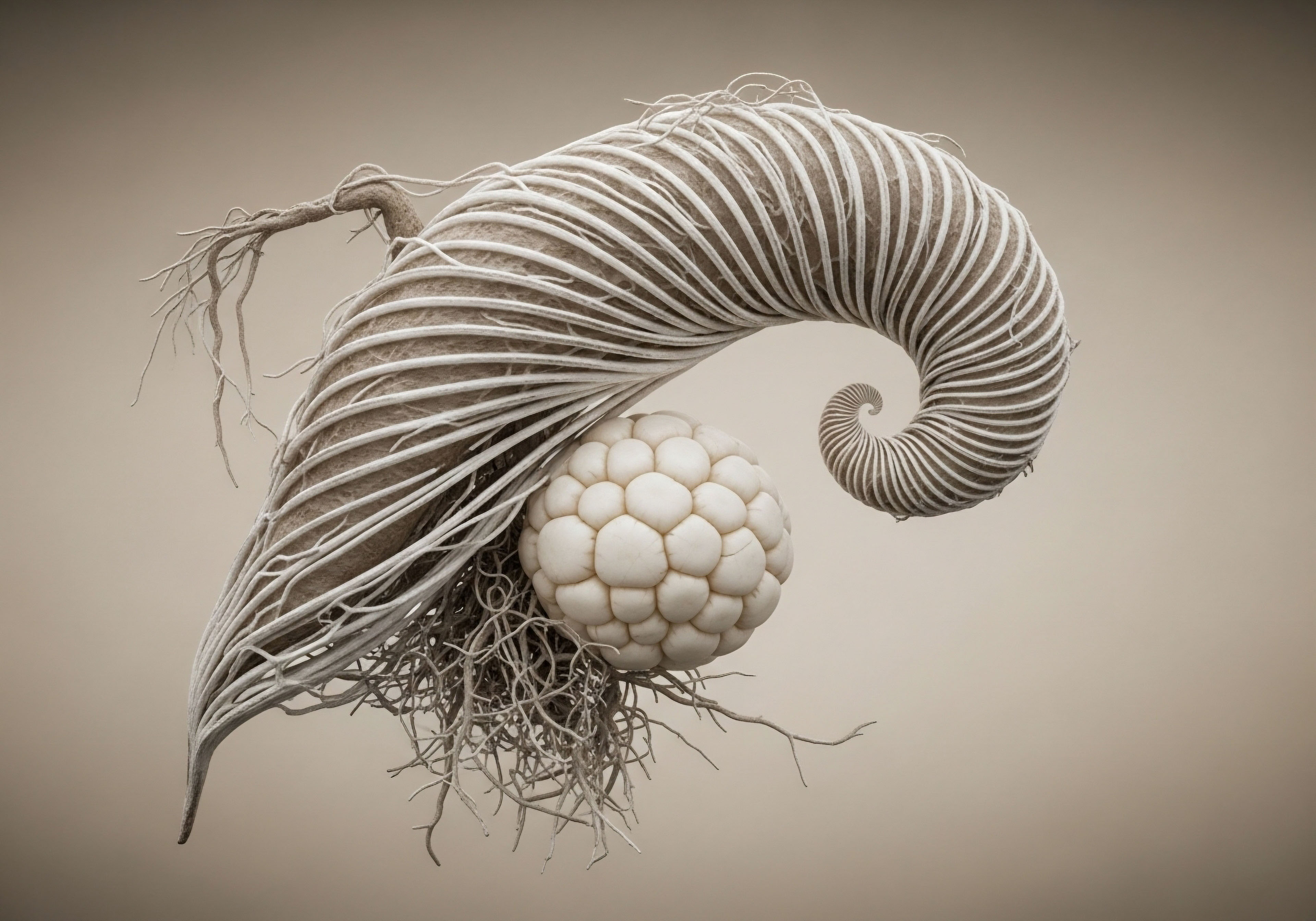

Fundamentals
Experiencing a subtle shift in mental clarity, a persistent fog that obscures sharp recall, or a diminished capacity for focused thought can be unsettling. Many individuals describe a feeling of their once-reliable cognitive faculties becoming less dependable, a quiet erosion of the mental agility they once possessed.
This experience often arrives gradually, manifesting as difficulty retrieving words, a reduced ability to concentrate on complex tasks, or a general sense of mental sluggishness. These changes are not merely a sign of advancing years; they frequently signal deeper physiological imbalances within the body’s intricate communication networks. Understanding these shifts requires looking beyond isolated symptoms to the foundational systems that govern our vitality.
The human body operates through a symphony of interconnected systems, each influencing the others in a delicate balance. Among these, the endocrine system stands as a master conductor, orchestrating a vast array of biological processes through chemical messengers known as hormones.
These hormones, produced by various glands, travel through the bloodstream to exert their influence on distant cells and tissues. They regulate everything from metabolism and mood to reproductive function and, critically, brain health. When this intricate hormonal equilibrium is disrupted, the effects can ripple throughout the entire organism, impacting energy levels, physical performance, and mental acuity.
Hormonal equilibrium is a critical determinant of overall well-being, influencing mental clarity and physical vitality.
Testosterone, often primarily associated with male physiology, plays a far broader role in both men and women than commonly perceived. While produced in larger quantities in the testes of men, the ovaries and adrenal glands in women also generate this vital androgen.
Its influence extends well beyond reproductive functions, impacting muscle mass, bone density, red blood cell production, and even mood regulation. A decline in optimal testosterone levels, whether due to aging, lifestyle factors, or underlying medical conditions, can manifest in a spectrum of symptoms that extend into the cognitive realm. Individuals might report a noticeable decline in their ability to maintain attention, process information swiftly, or retain new memories.
The brain, a highly metabolically active organ, is particularly sensitive to hormonal fluctuations. Neurons, the fundamental building blocks of the brain, rely on a stable internal environment to function optimally. Testosterone, and its metabolites, interact with specific receptors located throughout various brain regions, including the hippocampus, a structure central to learning and memory, and the prefrontal cortex, which governs executive functions like planning and decision-making.
This direct interaction suggests a significant role for testosterone in supporting neuronal health and cognitive performance. When testosterone levels fall below an optimal threshold, these brain regions may not receive the necessary hormonal signals to operate at their peak capacity, contributing to the cognitive symptoms many individuals experience.

The Endocrine System and Brain Health
The endocrine system’s influence on the brain is a complex interplay, often described through feedback loops. Consider the hypothalamic-pituitary-gonadal (HPG) axis, a central regulatory pathway. The hypothalamus, a region in the brain, releases gonadotropin-releasing hormone (GnRH), which signals the pituitary gland to produce luteinizing hormone (LH) and follicle-stimulating hormone (FSH).
These gonadotropins then stimulate the gonads (testes in men, ovaries in women) to produce testosterone and other sex hormones. This intricate chain of command ensures that hormone levels are tightly regulated. Disruptions at any point along this axis can lead to hormonal imbalances, impacting not only reproductive health but also neurological function.
The brain’s reliance on a consistent supply of hormones underscores the importance of endocrine balance for sustained cognitive function. Hormones act as internal messengers, conveying vital information that influences neuronal growth, synaptic connectivity, and neurotransmitter synthesis. A balanced hormonal environment supports the brain’s ability to adapt and reorganize itself, a process known as neuroplasticity.
This adaptability is essential for learning new skills, forming memories, and recovering from neurological challenges. Without adequate hormonal support, the brain’s capacity for neuroplasticity may diminish, potentially contributing to cognitive decline over time.

Recognizing the Signals of Hormonal Imbalance
Many individuals attribute cognitive changes solely to aging, overlooking the potential role of hormonal factors. Recognizing the subtle signals of hormonal imbalance is a crucial first step toward reclaiming cognitive vitality. These signals often extend beyond memory lapses or difficulty concentrating. They might include ∞
- Persistent fatigue, even after adequate rest.
- Reduced motivation or a general lack of drive.
- Changes in mood, such as increased irritability or feelings of sadness.
- Decreased libido or sexual function.
- Loss of muscle mass or an increase in body fat, despite consistent effort.
These symptoms, when viewed collectively, paint a clearer picture of systemic imbalance. They suggest that the body’s internal systems are not operating in optimal synchronicity. Addressing these underlying hormonal factors, particularly testosterone levels, offers a pathway to not only alleviate distressing symptoms but also to support long-term cognitive health. The journey toward understanding one’s own biological systems begins with acknowledging these signals and seeking precise, evidence-based explanations for their origins.


Intermediate
Understanding the profound connection between hormonal balance and cognitive well-being naturally leads to exploring precise clinical strategies for recalibrating these vital systems. Testosterone optimization protocols represent a sophisticated approach to restoring physiological equilibrium, particularly for individuals experiencing symptoms related to suboptimal androgen levels.
These protocols are not a one-size-fits-all solution; rather, they are meticulously tailored to individual needs, considering biological sex, age, symptom presentation, and specific health goals. The aim is to restore testosterone to a healthy, physiological range, supporting systemic function without compromise.

Testosterone Replacement Therapy for Men
For men experiencing symptoms of low testosterone, often referred to as hypogonadism or andropause, Testosterone Replacement Therapy (TRT) offers a well-established pathway to restore hormonal balance. The standard protocol frequently involves weekly intramuscular injections of Testosterone Cypionate, typically at a concentration of 200mg/ml.
This method ensures a steady delivery of the hormone, mimicking the body’s natural production rhythms. The objective extends beyond merely elevating testosterone levels; it encompasses a comprehensive strategy to maintain overall endocrine health and mitigate potential side effects.
A critical aspect of male TRT protocols involves co-administration of specific agents to preserve endogenous testicular function and manage estrogenic conversion. Gonadorelin, administered via subcutaneous injections twice weekly, is often included to stimulate the pituitary gland, thereby encouraging the testes to continue their natural production of testosterone and maintain fertility.
This contrasts with older TRT approaches that often suppressed natural production entirely. Additionally, Anastrozole, an oral tablet taken twice weekly, serves as an aromatase inhibitor. Its purpose is to block the conversion of testosterone into estrogen, preventing potential side effects such as gynecomastia or water retention that can arise from elevated estrogen levels. Some protocols may also incorporate Enclomiphene to further support luteinizing hormone (LH) and follicle-stimulating hormone (FSH) levels, contributing to the preservation of testicular function.
Testosterone optimization for men involves precise protocols to restore balance, maintain natural production, and manage estrogen levels.

Testosterone Optimization for Women
The role of testosterone in women’s health is increasingly recognized, particularly for those navigating the complexities of pre-menopausal, peri-menopausal, and post-menopausal transitions. Women experiencing symptoms such as irregular cycles, mood changes, hot flashes, or diminished libido may benefit from targeted testosterone optimization. The protocols for women differ significantly from those for men, emphasizing lower doses and specific administration methods to align with female physiology.
Typically, women receive Testosterone Cypionate via subcutaneous injection, often at a weekly dose of 10 ∞ 20 units (0.1 ∞ 0.2ml). This precise micro-dosing aims to restore testosterone to optimal physiological levels without inducing virilizing side effects. The approach acknowledges that even small adjustments in female hormone profiles can yield significant systemic benefits.
Furthermore, Progesterone is a frequent component of female hormone balance protocols, with its prescription tailored to the individual’s menopausal status. Progesterone plays a vital role in uterine health, mood regulation, and sleep quality, complementing the effects of testosterone. For some women, Pellet Therapy, involving long-acting testosterone pellets inserted subcutaneously, offers a convenient and consistent delivery method.
Anastrozole may be considered in specific cases where estrogen conversion requires management, though it is less commonly used in female protocols compared to male protocols.

Post-TRT and Fertility-Stimulating Protocols for Men
For men who have discontinued TRT or are actively trying to conceive, specialized protocols are implemented to reactivate and support natural testosterone production and fertility. This often involves a combination of agents designed to stimulate the HPG axis. The protocol typically includes ∞
- Gonadorelin ∞ Administered to stimulate the pituitary gland, encouraging the release of LH and FSH, which in turn signal the testes to resume testosterone production and spermatogenesis.
- Tamoxifen ∞ A selective estrogen receptor modulator (SERM) that can block estrogen’s negative feedback on the pituitary, thereby increasing LH and FSH secretion.
- Clomid (Clomiphene Citrate) ∞ Another SERM that works similarly to Tamoxifen, stimulating gonadotropin release and promoting endogenous testosterone production.
- Anastrozole (optional) ∞ May be included if estrogen levels remain elevated, to prevent excessive estrogenic effects during the recovery phase.
These agents work synergistically to re-engage the body’s intrinsic hormonal machinery, supporting a return to natural function.

Growth Hormone Peptide Therapy
Beyond direct testosterone optimization, advanced wellness protocols often incorporate Growth Hormone Peptide Therapy. This therapy targets active adults and athletes seeking benefits such as anti-aging effects, muscle gain, fat loss, and improved sleep quality. These peptides work by stimulating the body’s natural production of growth hormone, avoiding the direct administration of synthetic growth hormone. Key peptides utilized in these protocols include ∞
- Sermorelin ∞ A growth hormone-releasing hormone (GHRH) analog that stimulates the pituitary to release growth hormone.
- Ipamorelin / CJC-1295 ∞ These are growth hormone-releasing peptides (GHRPs) that also stimulate growth hormone secretion, often used in combination for synergistic effects.
- Tesamorelin ∞ A GHRH analog specifically approved for reducing abdominal fat in certain conditions, but also used for its broader metabolic benefits.
- Hexarelin ∞ Another GHRP with potent growth hormone-releasing properties.
- MK-677 (Ibutamoren) ∞ An oral growth hormone secretagogue that increases growth hormone and IGF-1 levels.
These peptides contribute to systemic recalibration, influencing metabolic function and cellular repair, which indirectly supports cognitive vitality by enhancing overall physiological resilience.

Other Targeted Peptides
The realm of personalized wellness extends to other targeted peptides, each designed to address specific physiological needs. Two notable examples include ∞
- PT-141 (Bremelanotide) ∞ This peptide is utilized for sexual health, acting on melanocortin receptors in the brain to influence sexual desire and arousal. Its mechanism of action is distinct from direct hormonal effects, focusing on central nervous system pathways.
- Pentadeca Arginate (PDA) ∞ PDA is gaining recognition for its role in tissue repair, healing processes, and modulating inflammation. Its systemic benefits contribute to a healthier internal environment, which is indirectly supportive of cognitive function by reducing systemic stressors.
These diverse protocols underscore a commitment to comprehensive physiological support. They acknowledge that optimal cognitive function is not an isolated phenomenon but a reflection of a well-regulated, balanced internal system. The precise application of these agents, guided by clinical expertise and individual biochemical profiles, represents a modern approach to reclaiming vitality and function.

Comparing Testosterone Delivery Methods
The choice of testosterone delivery method significantly impacts patient experience and physiological response. Each method offers distinct advantages and considerations, influencing absorption rates, consistency of levels, and patient adherence.
| Delivery Method | Typical Administration | Advantages | Considerations |
|---|---|---|---|
| Intramuscular Injections | Weekly (e.g. Testosterone Cypionate) | Consistent levels, cost-effective | Requires injections, potential for peaks/troughs |
| Subcutaneous Injections | Weekly (e.g. Testosterone Cypionate) | Easier self-administration, less invasive | Smaller volumes, requires specific needle size |
| Transdermal Gels/Creams | Daily application | Convenient, steady absorption | Risk of transference, skin irritation |
| Pellets | Surgically inserted every 3-6 months | Long-acting, consistent levels, high adherence | Minor surgical procedure, less flexible dosing |
| Oral (Methyltestosterone) | Daily tablets | Convenient | Potential liver toxicity, less common for long-term TRT |
Selecting the appropriate delivery method is a collaborative decision between the patient and clinician, based on individual lifestyle, preference, and clinical objectives.


Academic
The exploration of testosterone’s long-term cognitive benefits transcends simplistic correlations, delving into the intricate molecular and cellular mechanisms that underpin brain function. This deep scientific inquiry reveals testosterone not merely as a reproductive hormone but as a potent neurosteroid, influencing neuronal integrity, synaptic plasticity, and neuroinflammatory responses. Understanding these fundamental biological processes provides a robust framework for appreciating the sustained cognitive advantages associated with optimal testosterone levels.

Neuroendocrine Axes and Cognitive Function
The brain’s metabolic and structural health is inextricably linked to the precise regulation of various neuroendocrine axes. The hypothalamic-pituitary-gonadal (HPG) axis, as previously noted, is central to testosterone production. Disruptions within this axis, leading to hypogonadism, are associated with measurable cognitive deficits.
Research indicates that low endogenous testosterone levels in aging men correlate with poorer performance across several cognitive domains, including verbal fluency, visuospatial abilities, and executive function. The brain itself contains androgen receptors (ARs) in key regions such as the hippocampus, prefrontal cortex, and amygdala, suggesting a direct mechanism through which testosterone exerts its influence.
Testosterone’s impact extends beyond direct AR activation. It serves as a precursor for estradiol via the enzyme aromatase. Estradiol, in turn, possesses well-documented neuroprotective and cognitive-enhancing effects, particularly on synaptic plasticity and memory consolidation. This dual action ∞ direct androgenic effects and indirect estrogenic effects ∞ highlights the complex interplay of sex steroids in maintaining brain health.
The precise balance between testosterone and estradiol, often managed through agents like Anastrozole in TRT protocols, is critical for maximizing cognitive benefits while mitigating potential adverse effects.
Testosterone influences brain health through direct receptor activation and conversion to estradiol, impacting neuroplasticity and memory.

Cellular Mechanisms of Neuroprotection
At the cellular level, testosterone contributes to cognitive resilience through several sophisticated mechanisms ∞

Antioxidant and Anti-Inflammatory Actions
The brain is highly susceptible to oxidative stress and neuroinflammation, both of which are implicated in the pathogenesis of neurodegenerative conditions like Alzheimer’s disease and Parkinson’s disease. Testosterone exhibits significant antioxidant properties, neutralizing reactive oxygen species (ROS) that can damage cellular components and neuronal structures.
It also possesses anti-inflammatory effects, reducing the production of pro-inflammatory cytokines that contribute to chronic neuroinflammation. By mitigating these detrimental processes, testosterone helps preserve neuronal integrity and function. However, it is important to note that under conditions of already elevated oxidative stress, supraphysiological testosterone levels might paradoxically exacerbate damage, underscoring the importance of physiological optimization.

Neuronal Survival and Synaptic Plasticity
Testosterone plays a crucial role in promoting neuronal survival and enhancing synaptic plasticity, the brain’s ability to adapt and reorganize its neural connections. Studies indicate that testosterone can protect neurons against apoptosis (programmed cell death) and support the growth of neurites, which are essential for maintaining neural connectivity.
This neurotrophic effect is partly mediated by testosterone’s ability to regulate the expression of genes involved in neuronal survival and synaptic plasticity. For instance, its metabolite, dihydrotestosterone (DHT), has been shown to enhance synaptic plasticity-related proteins and activate signaling pathways that improve hippocampal synaptic structure, directly contributing to cognitive function.

Mitochondrial Function and Energy Metabolism
Neurons are highly energy-dependent cells, relying heavily on mitochondrial function for ATP production. Testosterone influences mitochondrial activity, enhancing ATP production and regulating redox homeostasis within neurons. By supporting robust mitochondrial function, testosterone ensures that brain cells have the necessary energy supply to perform complex cognitive tasks and maintain cellular integrity. This metabolic support is a fundamental aspect of its neuroprotective capacity, as mitochondrial dysfunction is a common feature in various neurodegenerative disorders.

Clinical Evidence and Long-Term Outcomes
While the mechanistic understanding of testosterone’s cognitive benefits is robust, clinical trial data present a more nuanced picture, reflecting the complexities of human physiology and study design. Early studies and meta-analyses have shown mixed results, often due to variability in patient populations, testosterone dosing, and cognitive assessment methods. However, more recent and well-designed studies, particularly those with longer follow-up periods, are beginning to provide clearer insights into the long-term cognitive advantages of testosterone optimization.
A systematic review and meta-analysis, including studies with follow-up periods up to 36 months, reported modest but statistically significant improvements in executive function in hypogonadal men receiving androgen replacement therapy. This analysis also suggested a positive association between testosterone dosage and cognitive improvement, highlighting the importance of personalized and optimized treatment regimens.
Other trials have indicated improvements in specific cognitive domains, such as spatial memory and constructional abilities, in men with mild cognitive impairment (MCI) or Alzheimer’s disease following testosterone supplementation. These findings suggest a potential therapeutic role for testosterone in mitigating cognitive decline in vulnerable populations.
The impact on mood and overall well-being, which often correlates with cognitive performance, has also been consistently observed. Testosterone replacement therapy has been shown to improve positive mood and reduce negative mood, with these improvements sustained over several years in hypogonadal men. This amelioration of mood symptoms can indirectly enhance cognitive function by reducing the burden of depression and anxiety, which are known to impair concentration and memory.

The Interplay with Other Hormones and Peptides
Cognitive health is not solely dependent on testosterone; it is a product of the entire endocrine symphony. The integration of testosterone optimization with other hormonal and peptide therapies reflects a systems-biology approach to wellness. For instance, growth hormone-releasing peptides (e.g.
Sermorelin, Ipamorelin) indirectly support cognitive function by enhancing cellular repair, metabolic efficiency, and sleep quality, all of which are critical for brain health. Peptides like Pentadeca Arginate (PDA), by reducing systemic inflammation, create a more conducive environment for optimal neurological function. This holistic perspective acknowledges that every biological system is interconnected, and optimizing one often creates positive ripple effects throughout the entire organism.
The long-term cognitive benefits of testosterone optimization are not merely about restoring a single hormone to a normal range. They represent a recalibration of the body’s fundamental biological systems, fostering an environment where neurons can thrive, synaptic connections can strengthen, and the brain can maintain its remarkable capacity for learning, memory, and executive function well into later life. This comprehensive approach, grounded in rigorous scientific understanding, offers a compelling pathway to sustained cognitive vitality.

References
- Cherrier, Michael M. et al. “Testosterone Supplementation Improves Spatial Memory in Older Hypogonadal Men.” Journal of Clinical Endocrinology & Metabolism, vol. 89, no. 10, 2004, pp. 5030-5036.
- Beauchet, Olivier, et al. “Testosterone and cognitive function ∞ current clinical evidence of a relationship.” European Journal of Endocrinology, vol. 156, no. 1, 2007, pp. 13-24.
- Zitzmann, Michael, et al. “Changes in cerebral glucose metabolism and visuospatial capability in hypogonadal males under testosterone substitution therapy.” Experimental and Clinical Endocrinology & Diabetes, vol. 113, no. 6, 2005, pp. 353-358.
- Galea, Liisa A. M. et al. “Endocrine regulation of cognition and neuroplasticity ∞ our pursuit to unveil the complex interaction between hormones, the brain, and behaviour.” Canadian Journal of Experimental Psychology, vol. 62, no. 4, 2008, pp. 247-260.
- Spandidos Publications. “Effects of androgen replacement therapy on cognitive function in patients with hypogonadism ∞ A systematic review and meta‑analysis.” Molecular Medicine Reports, vol. 28, no. 5, 2023, pp. 1-12.
- Wang, Christina, et al. “Long-Term Testosterone Gel (AndroGel) Treatment Maintains Beneficial Effects on Sexual Function and Mood, Lean and Fat Mass, and Bone Mineral Density in Hypogonadal Men.” The Journal of Clinical Endocrinology & Metabolism, vol. 93, no. 11, 2008, pp. 4303-4313.
- Hao, Song, et al. “An Updated Review ∞ Androgens and Cognitive Impairment in Older Men.” Frontiers in Endocrinology, vol. 11, 2020, pp. 586790.
- Sheng, Wen-Lin, et al. “Effect of Testosterone Replacement Therapy on Cognitive Performance and Depression in Men with Testosterone Deficiency Syndrome.” Journal of Clinical and Diagnostic Research, vol. 10, no. 10, 2016, pp. OC01-OC04.
- Rizk, Peter J. et al. “Testosterone’s Role in Neuroprotection.” Number Analytics, 2023.
- Ghasemi, Maryam, et al. “Is testosterone perspective available for neurodegenerative diseases?” Journal of Basic and Clinical Neuroscience, vol. 9, no. 1, 2021, pp. 1-10.

Reflection
The journey toward understanding your own biological systems is a deeply personal one, often beginning with a quiet recognition that something feels out of sync. This exploration of testosterone’s influence on cognitive vitality serves as a guide, translating complex scientific principles into actionable knowledge. It invites you to consider your own experiences, the subtle shifts in mental clarity or focus, not as inevitable declines but as signals from a system seeking balance.
Consider the profound implications of recognizing your body’s innate intelligence and its capacity for recalibration. What if the mental fog you experience is not a permanent state but a reversible symptom of hormonal imbalance? This knowledge empowers you to move beyond passive acceptance, encouraging a proactive stance toward your health. It suggests that sustained cognitive function and overall vitality are not merely aspirations but achievable outcomes through precise, personalized interventions.

Your Path to Reclaimed Vitality
This information provides a foundation, a scientific lens through which to view your own health narrative. It is a starting point for a dialogue with a clinician who understands the intricate dance of hormones and their systemic effects. Your unique biochemical profile, your lived experience, and your personal health goals form the blueprint for a tailored wellness protocol.
The objective is to support your body’s inherent capacity for optimal function, allowing you to reclaim mental sharpness, emotional equilibrium, and physical resilience.
How might a deeper understanding of your endocrine system transform your daily experience? Imagine a return to sustained concentration, clearer recall, and a renewed sense of mental energy. This is the potential offered by a scientifically grounded, empathetic approach to hormonal health.
The path forward involves careful assessment, precise intervention, and a commitment to supporting your body’s remarkable ability to heal and optimize itself. Your vitality is not a fixed state; it is a dynamic expression of your biological systems, capable of being recalibrated and restored.



